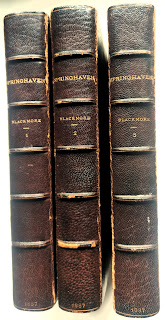Quercus paperback edition - 2023
This is one of the best historical novels I have read for a long time. A few years back, I bought Shona MacLean's four books in her Alexander Seaton series and enjoyed them. So, I was delighted when my daughter gave me this novel for my birthday. It is not surprising that MacLean has a PhD in History, specialising in 16th and 17th century Scottish history, as it is abundantly clear that she knows her historical onions!
After the Battle of Culloden - on 16th April 1745 - Iain MacGillivray was left for dead on Drummossie Moor. He survived, only by pretending to be dead when the Duke of Cumberland's forces 'swept' the moor, killing those Jacobites still perceived to be alive. His best friend, Lachlan, lying next to him, perished. Six years later, his brutally slashed face still bearing the marks of the battle, finds Iain working as a bookseller in Inverness. A stranger enters the shop and begins to scan shelves, taking books out, opening them, cursing, shoving them back in. He is searching through the books once belonging to the 'Old Fox', Lord Lovat, executed in London for his part in the 1745 Rebellion. The next day, on opening the bookshop, Iain finds the man dead with his throat cut. The murder weapon lies next to him - a sword with a white cockade on its hilt, the emblem of the Jacobites. The man, Davie Campbell, was a scoundrel, a thief and assassin for hire, bought to find out who had betrayed Jacobites in the past.
Iain, and the reader, are henceforth to be enmeshed is a tale of revenge and deceit - and murder.
Shona MacLean points out, in her Author's Notes, that at every turn in the Jacobite story, you will find tales of the courage and agency of women, and her story is peppered with striking examples. There are the Grandes Dames, two of whom we first meet in the Prologue of May 1716. Mairi Farquharson (Iain's grandmother, although he is born out of wedlock to her wayward daughter, Charlotte) and her friend Janet Grant are to play fundamental (if rather different) parts over three decades later. The other Dames are Catriona Lamont and Eilidh Cameron. Other major roles are played by Mrs Elizabeth Rose and her daughter Julia, both technically Hanoverians, but very different in character. Then there are Ishbel MacLeod, a confectioner, and Barbara Sinclair, a Milliner, who has favoured Iain with her bed on more than one occasion. All these women add a vibrancy and a verisimilitude to the novel.
This not to say that the author cannot create life-like and compelling male characters: such as Aeneas Farquharson, Mairi's kinsman and 'servant'; Donald Mor, Iain's bookbinder, who spirals out of roaring control during his regular drunken sprees; Richard Dempster, Iain's assistant, English born but wedded to the Jacobite cause; Arch MacPhee, Inverness town constable and boyhood friend of Iain; little Tormod MacLeod, Ishbel's mixed race son; and, two sides of the British government's coin - the upright Major Philip Thornlie and the blackguard Captain Edward Dunne.
The story-line, plotting and narrative drive are all good, but what makes this an excellent read for me is the character drawing. Here are a few examples:
Donald Mor - then came the familiar shout from the bindery, a stream of Gaelic invective rounded off with, 'A-mach a seo! Get out of here!' and then, 'Son of Damnation, Iain Ban, there's a man here will die of thirst...Donald would have his wages on a Friday night. Little could be done about the outrages he would perpetrate between then and when he last stumbled senseless to his bed at some point on the Saturday, but he could thereafter be relied upon not to be seen about the streets of Inverness until the Monday morning. He would then be a model of sobriety until the next Friday night.
And there they were, suspended in the candlelight against the background of dark wood, heavy velvet and damask, as if captured in oils by Allan Ramsay himself: the Grandes Dames. His grandmother Mairi Farquharson and her three lifelong friends: Catriona Lamont, Janet Grant and Eilidh Cameron, Swathed in silk and lace, their jewels glittering, flickering light from fire and candelabra turning the amber in their crystal punch cups to liquid gold. The silver strands in their hair, the lines on their brows, the veins on the backs of their hands carried in them the whole story of the Jacobite cause...they had ridden out, each one of them, behind the men of the '15 rising in the name of King James...
Major Thornlie - the barrier between ourselves and savagery is finer than gossamer. Once rent, we do not easily recover ourselves... He looked at his reflection in the glass and considered what he saw. Was it a fool? He was forty-three years of age and blind in one eye...the man looking back at Philip Thornlie from the glass was not a fool, and there was time yet to ask something more of life.
Captain Dunne: it is important to distinguish between a cause that requires pity, and one that requires discipline.
Above all, there returns Iain's father, Hector MacGillivray, engaged in a secret mission for yet another rising on behalf of the Stuart cause. Presumed dead by most, including Iain, he now comes back to dominate those around him. He had come further into the light and under its glow he seemed little changed. Sixty-three years old now, and the handsome face was almost as firm, the stomach as flat as Iain remembered...the look in his eyes was that of a man not ready to relinquish his prime, and the back was straight as a ramrod.
Thoughts of R.L. Stevenson occurred as I was reading MacLean's novel. I think he would not have been displeased to be linked to the author.




